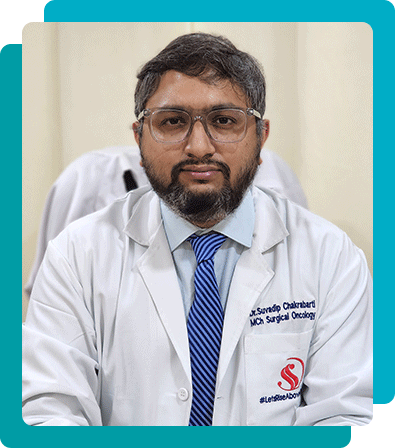Thyroid Cancer Doctor in Kolkata
Dr. Suvadip Chakrabarti

What is Thyroid Cancer?
Types of Thyroid Cancer
Thyroid cancer types are as follows:
- Papillary Thyroid Cancer
- Follicular Thyroid Cancer
- Medullary Thyroid Cancer
- Anaplastic Thyroid Cancer
Symptoms of Thyroid Cancer
A lump in your neck:
This is the most common symptom of thyroid cancer. It usually feels hard and is painless.
Changes in your voice:
Hoarseness or other voice changes.
Difficulty swallowing or breathing:
When the cancer grows, it can press on delicate structures like the windpipe, making it hard to swallow or breathe.
Pain in your neck or throat:
Cancerous tumours can irritate surrounding tissues and nerves, causing pain in the neck or throat.
Swollen lymph nodes in your neck:
When cancer cells spread, they can go through the lymphatic system and get trapped in lymph nodes, causing them to swell.
Causes of Thyroid Cancer

Family history
Having a family member with thyroid cancer, especially medullary thyroid cancer, increases your risk.

Genetic syndromes
Certain genetic conditions, such as multiple endocrine neoplasia (MEN) and familial adenomatous polyposis (FAP), can increase the risk.

Iodine deficiency
Although rare in developed countries because of iodized salt, severe iodine deficiency can be a factor.

Age
The risk of developing thyroid cancer rises with age.

Radiation exposure
People who received radiation treatment to the head or neck as children are at higher risk.
The Stages of Thyroid Cancer
Stage II: Cancer has grown beyond the thyroid gland, possibly involving nearby tissues and lymph nodes.
Stage III: Cancer has spread to lymph nodes in the neck and may involve nearby structures.
Stage IV: Advanced cancer that has spread to distant parts of the body, such as the lungs, bones, or other organs.
Treatments of Thyroid Cancer
Surgery
This is the most common treatment for thyroid cancer. It involves removing all or part of the thyroid gland.
Total thyroidectomy:
This thyroid cancer surgery involves the removal of the entire thyroid gland.
Lobectomy:
It involves the removal of one lobe of the thyroid gland.
Near-total thyroidectomy:
This thyroid cancer medical procedure involves the removal of almost the entire thyroid gland, leaving a small amount of tissue.
How to Prevent Thyroid Cancer?
Genetic counselling:
If you have a family history of thyroid cancer, especially medullary thyroid cancer, genetic counselling can help assess your risk and potential preventive measures.
Regular check-ups:
Regular medical examinations, including thyroid checks, can help detect early signs of thyroid problems.
Healthy lifestyle:
Maintaining a healthy weight by consuming a balanced diet and performing regular exercise can contribute to overall well-being.
Frequently Asked Questions (FAQs)



